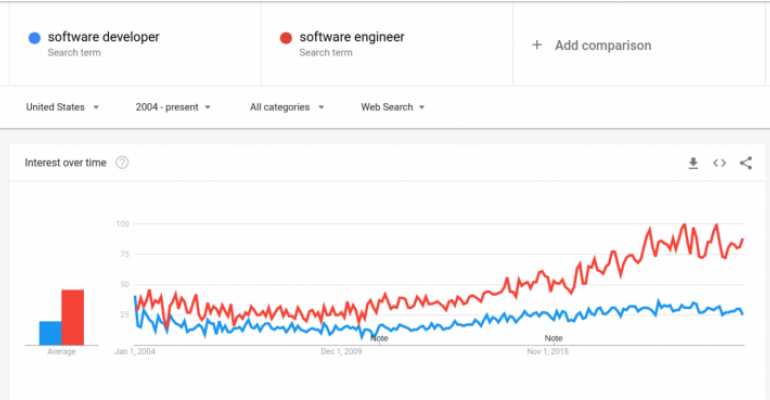To many ears, software developer and software engineer may sound like interchangeable terms. In certain contexts and to a certain degree, they are. But there are also important differences between these two terms. Depending on your goals and priorities, calling yourself a software engineer vs. developer (or vice versa) can make a difference.
Here's why.
Software Engineer vs. Software Developer: A Brief History of Two Terms
To understand the way we talk about a software engineer vs. software developer today, it helps to look at the surprising historic differences between the two terms.
Google’s Ngram viewer, which records how frequently given terms appeared in books published each year (specifically, books that Google has indexed), shows that the term software engineer has been in use since the 1960s. It rose steadily in popularity until about the year 2000, when it declined somewhat. (The data here probably reflects the dot-com bubble burst, which presumably reduced the overall number of books that discussed programming in any way.)

In contrast, software developer came into use only around 1980, although its popularity surged quickly at that point. It reached a peak in the 1990s, then declined precipitously--more so than software engineer did--around the time that the dot-com bubble burst.

If you look closely enough, you'll also see that software engineer is used about three times as frequently as software developer in books published in the last few years today.
This is far from perfect data, of course. It represents only appearances of the terms inside books indexed by Google, and it doesn't account for contexts where authors might use the term developer on its own instead of software developer.
Still, we can draw the high-level conclusion that the term software engineer is significantly older--and, on the whole, probably more popular--than software developer.
For what it's worth, Google Trends--another highly imperfect but still useful measure of terms' popularity--affirms the idea that software engineer is the more popular term. Here is the relative trendiness of the two terms from 2004 to present:

Software Engineer vs. Developer Today
The data above align with anecdotal examples of the way that people discuss the differences between software engineering and software developer at present. In many cases, these discussions assign the greatest prestige and value to software engineers.
For instance, Codegiant writes that software engineers are the "real deal" and the "overseers," responsible for integrating together the code written by software developers.
Software Engineer vs. Developer Salary
The fact that software engineers are paid more than software developers is another indicator of a widespread idea that software engineering is the most complex and valuable type of coding work.
If you're a coder, then, the takeaway here should be clear: You're likely to earn more money and be given more interesting work if you present yourself as a software engineer rather than a software developer.
Becoming a Software Engineer vs. Software Developer
That lesson may seem simple enough. But things get complicated when you think about what it actually takes to become a software engineer, as opposed to a developer.
Preparation-wise, both terms or job titles would seem to be the same. Most colleges and universities that teach programming give their students degrees in "computer science" (which is another very messy term, but I digress). Graduates with such degrees can call themselves either software developers or software engineers, according to their wishes. In other words, it's not as if you need a degree in software engineering specifically to be a software engineer.
Nor is there an obvious difference in the skills you actually need to be a software engineer vs. developer. A programmer working under the aegis of either title will need deep familiarity with programming languages, application architectures, DevOps concepts and so on.
What this means is that, to a large extent, coders can call themselves whatever they want, regardless of their background or specific skills. So, if you want to be a software engineer because it may improve your career trajectory, start describing yourself as such.
And if you're already in a software developer role but want to upgrade to being a software engineer, there's nothing stopping you from doing that, either, apart from having to explain in a job interview how your experience as a developer prepares you to be an engineer. But that shouldn't be too much of a challenge: If you focus on your experience with software architectures and bigger-picture programming tasks, you'll sound like an engineer easily enough.
Software Engineer vs. Software Developer: A Difference That Matters Only If You Allow It to
In short, there is a clear difference in the popular mind between software development and software engineering. The latter is held in somewhat higher esteem.
But the good news is that, when it comes to the actual skills and work associated with each role, there's arguably not much of a meaningful difference. If you want to be a software engineer, go ahead and be a software engineer.





